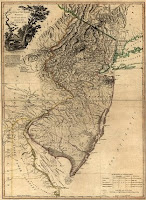
The special thing about New Jersey was the word “inhabitants.” Whereas all other state constitutions specified that their franchise was limited to men, New Jersey’s 1776 state constitution left the word “inhabitants” unqualified by gender in declaring that “all inhabitants of this Colony…shall be entitled to vote….” There’s some debate as to whether or not this constitutional aberration was intentional, and in 1807 the New Jersey legislature brought the state in line with the national norm by clarifying that, from thence forth, “inhabitants” meant “white men.” For about thirty years, however, women had the vote and took advantage of it (occasionally over and over again in a single election, but that’s another story). However, that’s not what’s so interesting.
What’s interesting is that, in many of the American colonies before the Revolution, the language dictating who could and could not vote was just as gender-neutral as New Jersey’s became in 1776. And yet, except for a very few individual incidents, women did not vote. That’s not to say that they could not vote; it’s to say that the question of whether or not they could never came up. The idea of a woman voting was, for most colonists, literally unthinkable. It was so unheard of, so far “out there,” that it hardly occurred to anyone to forbid it. Hence the absence of gendered specificity in the franchise requirements of so many colonies.
The McNeil Center for Early American Studies hosted a round-table discussion last night on Rosemarie Zagarri’s book Revolutionary Backlash: Women and Politics in the Early Republic, which makes reference to the brief period of women’s franchise in New Jersey. I bring it up here because it reminded me of an intriguing truth: some the greatest transitions in history have involved shifts, not in what people did or even what they thought they should do, but in what they imagined was possible. It’s one thing to believe quite strongly that only men should be allowed to vote. It’s something else to have never even considered the possibility of a woman voting.
There’s a certain kind of blissful ignorance in the unthinkable. The man (or woman, for that matter) who has never really imagined the possibility of a female franchise is certainly nonetheless a narrow-minded sexist. But he is a sexist without the passion, without the twisted, derogatory logic and chauvinistic arguments that are so integral to maintaining a conscious bigotry. He’s also, in his own way, singularly immune to change. You cannot reason with someone who finds your argument so outlandish as to dismiss it out-of-hand or finds it so absurd as to view it as hysterical. An idea first has to be taken seriously, to enter the realm of true contemplation, before it can ever possibly become convincing.
In the view of some historians, and I’ll hesitantly place myself among them, one of the most dramatic effects of the American (and later the French) Revolution was to make the previously unimaginable imaginable. The rhetoric of equality and liberty, hardly new, was deployed so liberally and repeatedly that people, some for the first time, began to seriously think about what it meant for all people to be “created equal.” The effects were not always laudable; after all, once the idea occurred to them, all the new states except for New Jersey simply added explicit prohibitions against women voting. But it was a first, and necessary, step. The idea of human equality had to work its way into the minds of the people, even if it would be centuries before they actually started to think it was a good idea.
If it’s difficult to imagine the idea of women voting being truly unthinkable in the early 1700s, we might set it alongside some other once ‘unthinkable’ ideas. The idea that slavery is a terrible evil is a notion that, at various times for various societies, has been outside the realm of serious contemplation. Before about 1750, you find precious little evidence of anyone even raising the possibility, and it isn’t until the 1800s that anyone really bothered to develop coherent counter-arguments in favor of slavery. Such things simply weren’t needed before.
More recently there’s the issue of moral-vegetarianism and animal rights. There was a time in my own life when it had never even occurred to me that eating a hamburger might be an act comparable with murder. It’s a concept which, I think, still lingers on the fringe of the seriously imaginable in American society. If moral-vegetarianism is ever to really take hold in America, we will first have to reach a point at we seriously contemplate why it is that we think it’s OK to kill and devour other animals and then ask ourselves if those reasons are logical and consistent. Thus far, those sorts of questions have very little common currency. We’re still far more pre-occupied with other quandaries, like “Do I want fries with that?”
No comments:
Post a Comment